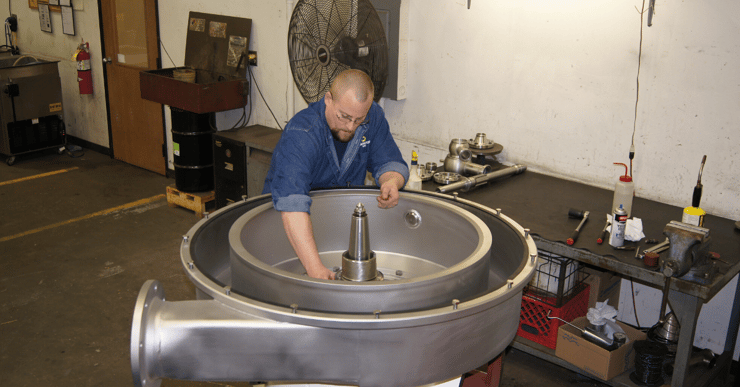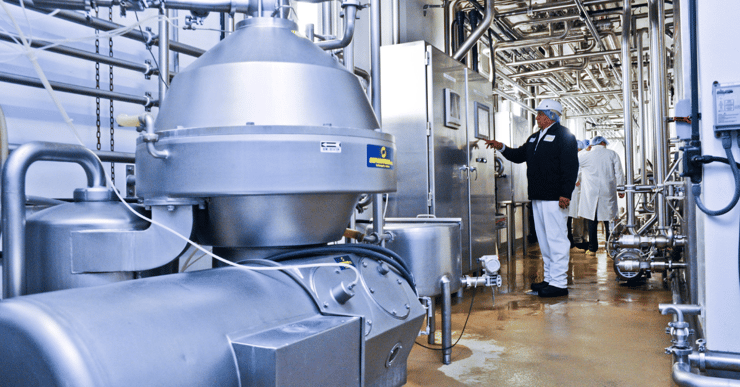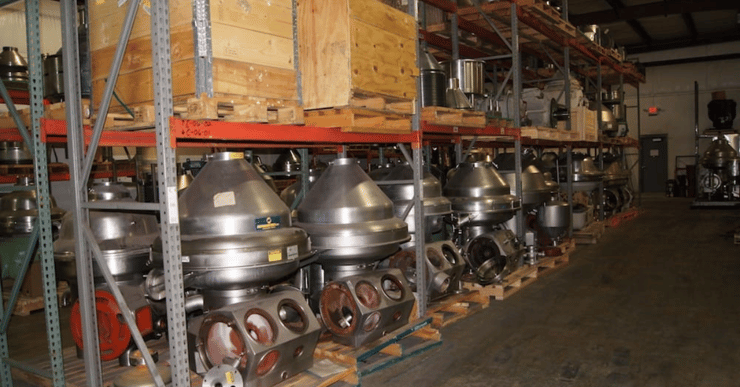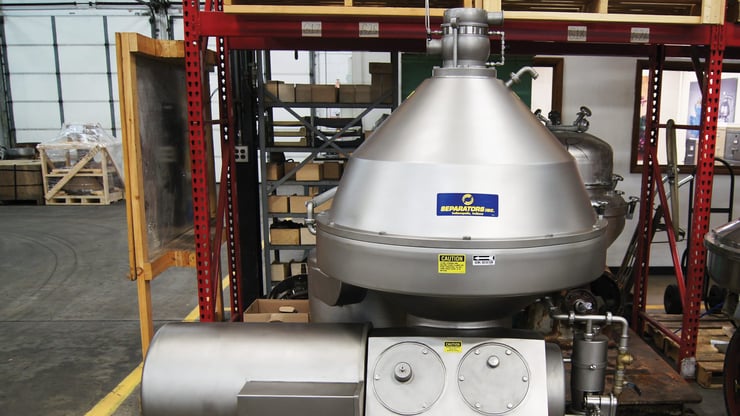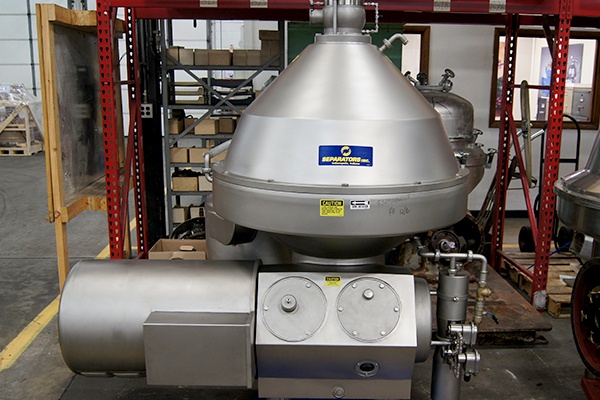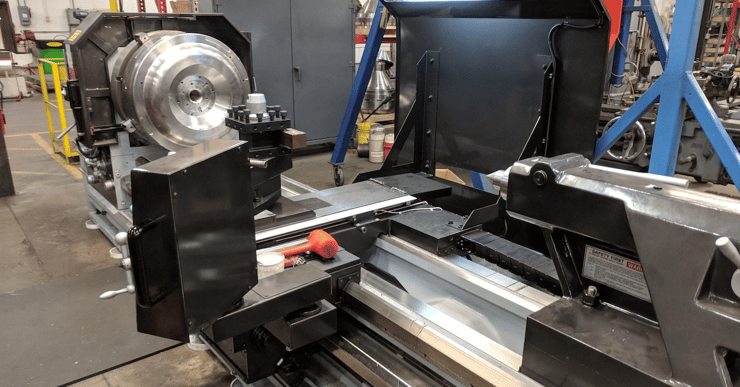Search Separators
Recent Posts
How To Prepare for Centrifuge Machine Maintenance
Minor and major centrifuge service visits are staples for keeping your production line running. Because these visits require our technician to complete all of the work at your facility, there are a few things you’ll need to prepare for prior to the day of your service.
Video: What's Included in a Service with Separators?
Are you familiar with what's included in our services at Separators? It's a question we receive quite often out in the field from our customers. From preventative maintenance to emergency services, and everything in-between, our team offers comprehensive service packages. Below is a video illustrating some of these services more in-depth:
Video: Don't Ignore Centrifuge Maintenance
When routine maintenance needs go unnoticed or unattended, larger issues with equipment can result. Oftentimes, problems that become serious and require immediate attention could have been prevented by thorough centrifuge maintenance.
So here’s what you need to know about upkeep and maintenance to hit your production volumes while also preventing a catastrophic event.
Stick to a service schedule
At Separators, we have found that the following maintenance schedule helps keep our clients up and running at their expected production volume, without creating too many downtime disruptions.
Minor service — Recommended every 6 months, minor service focuses on looking at the inside of your centrifuge bowl for worn parts and other red flags that could lead to downtime in the near future.
Major service — Recommended once a year, this service includes everything we do in a minor service, plus a full inspection of your frame and high-value parts.
If you’ve never worked with Separators before, we’ll start with a major service so that you can get an understanding of the current condition of your centrifuge bowl and frame. From there, we can list out our recommendations and replace parts that require repair. Generally, if we identify a part on your centrifuge that won’t make it through the next 12 months, we’ll opt to replace it to help you avoid unexpected downtime.
Be proactive about stocking spare centrifuge parts
We know that your plant doesn’t have a ton of storage space — but it’s well worth it to set aside a few shelves to store essential spare centrifuge parts, including gaskets, extra discs, and even a minor service kit. When you have these parts at your disposal, you can fix issues in the moment (such as an extra disc to your bowl, versus trying to accommodate inconsistencies in your product).
At Separators, we’ll keep a Bill of Material (BOM) kit on hand for your equipment to help make sure we have what you need in the event that maintenance is required at the drop of a hat.
Use service visits to train your staff
Our team’s technicians partner with your maintenance staff to educate and help grow their skills. During our minor and major services, we encourage your staff to shadow our technicians to learn more about the inner workings of your centrifuge (and how to identify warning signs that something isn’t working properly).
Extend equipment life
Whether you're looking to improve your separation process, optimize your flow rate, or extend the life of your equipment, maintenance is a large part of the answer. Taking care of your equipment makes it possible to get many more years of productive life out of it.
Avoid emergency maintenance
Keeping your equipment well-maintained can prevent potentially dangerous situations and emergency service visits. Because you won't have to stop processing unexpectedly, you won't lose nearly as much production time to a maintenance visit as you would to emergency service needs. In this way, preventing emergency centrifuge service can save you a lot of time and money in the long run.
In order to further illustrate the importance of maintaining your equipment, we put together a video focusing on the three areas of maintenance in response to our customers' questions on centrifuge upkeep:
Non-binding Centrifuge Service Contracts - What You Need to Know
Both routine maintenance and occasional service are essential to keeping your equipment running optimally. This is to say, centrifuge service cannot be skipped or avoided, but it can be made easy.
Did You Know a Remanufactured Centrifuge Cuts Your Wait Time in Half? Here's How.
One of the biggest obstacles our customers face is time. There never seems to be enough of it. And in the case of centrifuge failure, getting your current machine operational or replacing it with a new one is an urgent task. Every moment that a machine is down can lead to lost production, decreased plant efficiency, and wasted employee time.
Luckily, we've developed a way to get facilities back to production-ready much faster than the OEMs can provide a new centrifuge. Our Quick Delivery Program reduces the wait time for facilities in need of high-quality centrifuge equipment. We can deliver a remanufactured centrifuge that fits your current layout in weeks instead of months.
How Do I Find A Trustworthy Centrifuge Service Provider?
Finding a trustworthy centrifuge service provider is important, but how is it done? With the right approach to centrifuge service, your facility will run more smoothly and your final product will be of higher quality. Sometimes, it can be difficult to know if a service provider is trustworthy until after you’ve started working together. To help you figure it out sooner, here are a few qualities to look for.
Time is Critical to Keeping Your Separation Equipment Operational
Time is one of those things we never seem to have enough of. Even (or should I say especially) facilities that run 24 hours a day could use more time. Sometimes, the need to get more and more done in the same number of hours can make it even more difficult to make time for maintenance. Pausing operations for preventative care can be stressful, but ignoring those needs can lead to an even greater loss of time and productivity.
5 Centrifuge Service Provider Must-Haves
Keeping separation equipment running and functioning at optimal levels is critical to many applications, and working with a qualified service provider can make all the difference. Here are five things to look for when you’re choosing a centrifuge service provider.
Visit Us at the 2018 International Cheese Technology Expo
In just a few short days, I’ll be attending the 2018 International Cheese Technology Expo. This event, which takes place April 17-19 at the Wisconsin Center in Milwaukee, WI, is an opportunity for attendees to increase their understanding of, exposure to, and expertise in the cheese industry. The Wisconsin Cheese Makers Association describes the event like this:
FAQs Regarding Our Remanufactured Centrifuge Equipment
These are the most frequently asked questions about our remanufactured centrifuge equipment:

